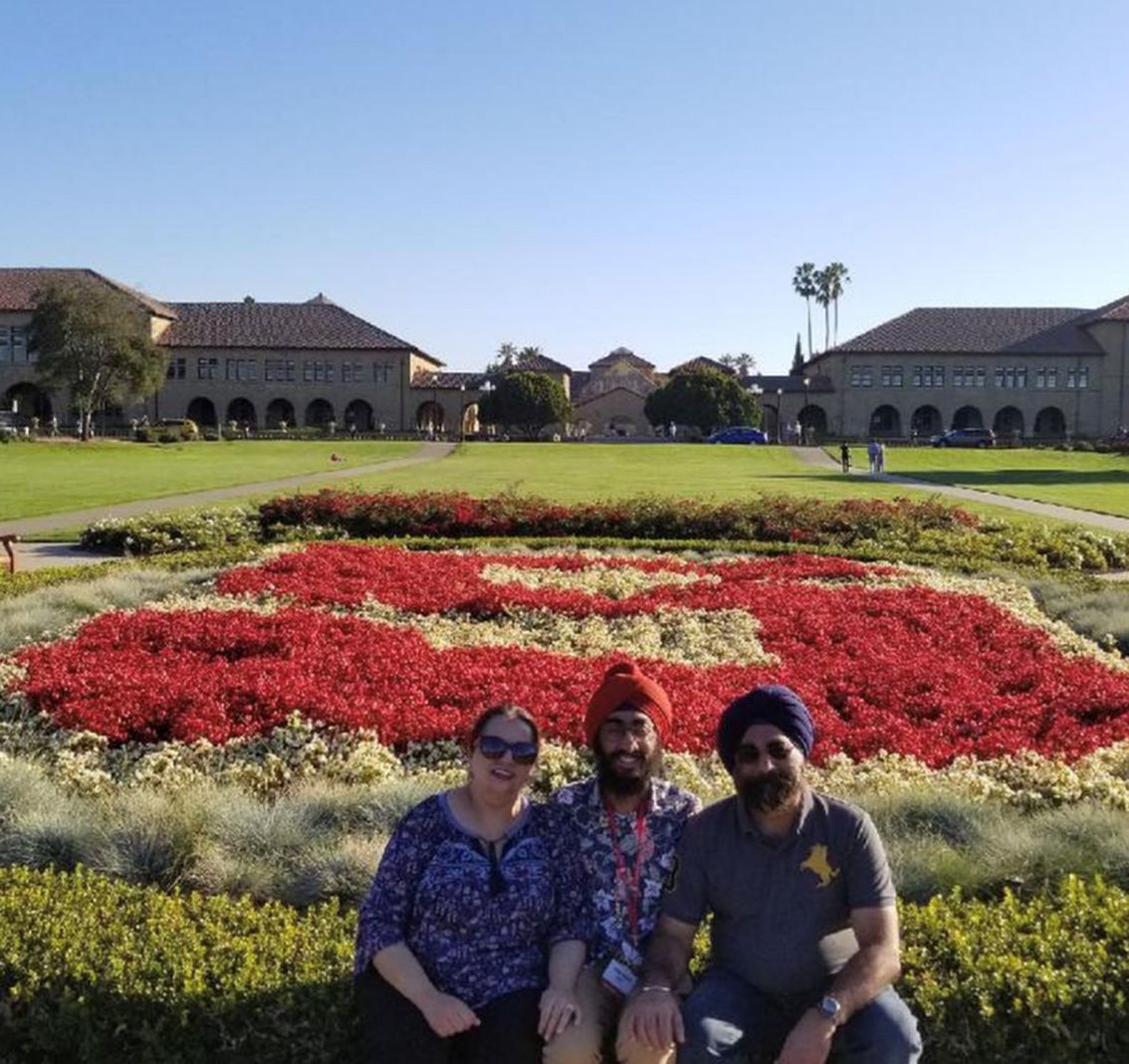I’m an only child, which meant a lot of summers spent figuring out how to entertain myself while my parents prayed I wouldn’t burn the house down. One summer, I became completely obsessed with Club Penguin. I’m talking full-blown, living-my-best-life-as-a-pixelated-penguin obsessed. And yes, I may have been borrowing my parents’ credit card information to deck out my igloo with disco balls. (I was obsessed with Saturday Night Fever, so what do you expect? My penguin needed to boogie like John Travolta!) So, you can imagine the sheer panic that set in when I forgot my password and got locked out of my account. Eventually, it prompted me with a security question my dad had set years earlier: “What was your dream job as a child?”
I sprinted downstairs like the house was on fire and screamed, “Papa! I need to know your childhood dream job so I can get back into Club Penguin!”
Without missing a beat, he pointed to one of the answer choices he’d set: “Computer Genius.” And that is how I regained access to my igloo—and accidentally discovered my father’s lost dreams.
My father’s childhood dream sprouted to life in the late 1980s, when he arrived at the University of Kansas as a new international student from Singapore to study computer science. One summer, feeling homesick for his extended family, he decided to drive north to Minnesota to visit a Singaporean friend. Still unfamiliar with the country—and its interstate system—he missed an exit on I-35 and accidentally ended up in a place he still affectionately calls “Des Moines” (pronouncing both s’s). That night, he slept in the back of his Nissan Sentra in the parking lot of what he described as “a tall building that looked like a lighthouse.”
That unexpected detour off the interstate led my father straight to the doors of Principal Financial Group’s global headquarters—just as they happened to be transitioning away from a mainframe computer system and urgently needed software engineers who knew COBOL. What began as a wrong turn became a right place, right time moment that sparked a 30-year career, a steady foundation for his future family, and the life we would one day call home.


But my father’s dream of becoming a “computer genius” was gradually sidestepped. Racism, corporate ceilings, and the demands of raising a child rerouted that dream. Langston Hughes asks in his famous poem “Harlem,” “What happens to a dream deferred? Does it dry up like a raisin in the sun? Or fester like a sore—and then run?” Like many immigrant dads, he passed his dream on—to me.
My childhood was full of “enrichment.” At 11 years old, my father had enrolled me in school science fairs. At 13 years old, I started learning how to hack into Apple devices and making YouTube tutorials about it. This eventually led to an obsession with hacking anything I could get my hands on: including a bucket of forgotten master locks at the YMCA, which I cracked open using iterative long division to reverse-engineer their combinations.
But while my childhood ambitions of busting into old YMCA master locks seemed more likely to land me in juvenile detention than in the Ivy League, my father had his eyes set on a different goal: standardized testing. At 14 years old, I took my first ACT exam—I would eventually retake the test seven times until I received a high enough score my father thought would merit my admission into the college of his dreams: Stanford.
Taking the ACT seven times was likely related to the fact that my father also taught ACT test-prep classes to local high school students every weekend since I can remember. That relentless pursuit wasn’t just about ambition; it was also deeply cultural. My father, born and raised in Singapore—a country where standardized testing is practically a national sport—had internalized the belief that test scores and discipline weren’t just résumé fluff; they were a lifeline. In an overpopulated nation with limited resources and fierce competition, scoring high meant securing your future.
So, when I finally arrived at Stanford, I had a moment of realization: I was not special. The campus was full of kids like me—Asian American children raised on deferred dreams, groomed since preschool to earn their spot at Stanford. We were walking proof of our parents’ sacrifices, their anxieties, and their unrelenting hope.

But long before Stanford, and long before ACT prep and master lock hacking—there was an even younger version of me, sitting in an elementary school classroom, desperate to prove I was a genius in my father’s eyes. Back then, the golden ticket for me wasn’t an Ivy League admission; it was a high score on the Cognitive Abilities Test (CogAT), the key to entering “TAG,” the Talented and Gifted program at my school. My father had first learned about this so-called academic elite, mostly made up of wealthy Asian boys, at Indian parties, where desi uncles and aunties would casually brag about their “genius” children being pulled from regular class for special enrichment. Ordinary school wasn’t enough; their kids needed special school. TAG meant legitimacy in our desi circles. A badge of honor at Indian dinner parties. So naturally, my father signed me up for one of these genius-screening tests to be placed into TAG, and just like that, my initiation into the world of performance-based love had begun.
I remember being pulled out of class, being invited to sit in the special “TAG” room (the room could have been gold-plated for all I know), and seeing the CogAT test questions laying in front of me. The test content itself was a haze, but I do specifically remember that there were diagrams of boxes that were unfolded and two-dimensional, marked with serrated lines. I had to select the answer that best represented what it would look like if I folded the boxes together. In other words, the test asked me to take the 2D drawing and imagine it in 3D. I couldn’t figure it out. The knuckles around my pencil became white. My jaws clenched tight. I started raging at these stupid flat box diagrams. How dare these boxes prevent me from entering the elite Asian boys club! How dare they get in the way of earning my father’s love!
Eventually, my score came through the TAG Teacher. She met with my father and me, and she simply said my score was “Average” and would not qualify me to enter TAG. Although average technically means “normal,” I felt anything but normal. I felt deeply abnormal. I felt stupid, inadequate, and a failure compared to my “gifted” peers.
That early wound stuck with me. And it reopened recently in an unexpected way. As a first-year doctoral student in counseling psychology, I had expressed a strong interest in working with children, envisioning that my practicum would involve providing talk therapy, involving connection, dialogue, and healing. The child-focused psychology site I applied to initially assured me that therapy would be part of my role. However, I later learned they lacked a credentialed supervisor for therapy, meaning I would be limited to conducting intelligence assessments. Although I requested a reassignment, I had ranked this site highest in my application, so I was required to proceed. In hindsight, I believe my unspoken protest of this decision manifested in my disengagement from my intelligence assessment course. I turned in assignments late, skimmed the testing manual just enough to administer assessments, and occasionally failed to correct my administration errors. As someone who prides himself on being a conscientious student—and who hasn’t earned a B since high school—this response felt out of character. I now recognize that my frustration with psychological testing, rooted in earlier personal experiences, was projected onto a course that symbolized what I perceived as an outdated and potentially harmful practice.
But it wasn’t just resurfaced trauma that made assessment feel so difficult. It was also that the structured, rule-bound nature of testing clashed with something core to who I am: a love of improvisation. My undergraduate major was in Theater and Performance Studies. I’ve always thrived in spaces that reward spontaneity, creativity, and human connection—none of which I initially saw reflected in the cold, fluorescent-lit, clinical world of standardized testing. At the time, administering IQ tests felt like a personal insult.
Thankfully, a series of honest conversations with the Counseling Psychology faculty at the University of Iowa began to shift that perspective. One professor told me, “You can’t jump out of the box until you’ve learned to sit in it.” And suddenly, it clicked.
The boxes from my childhood—the ones I failed to fold on my CogAT test—had once felt like traps, like mechanisms designed to measure my worth and expose my inadequacy. But now, I began to see them differently. Maybe the task was never just about folding boxes in the right way—it was about learning to study them, sit inside of them, and understand their structure before finding the freedom to improvise beyond them. What once felt like a test I failed became a framework I could grow within.
So, this summer, I practiced intelligence tests with volunteers. I checked my administration errors. And I started reading the manual in greater depth. I also did some personal research and learned how IQ testing has been used—not just to gatekeep—but to advocate.
One study showed that universal IQ screening helped identify giftedness in low-income and minority students—kids who often get overlooked when only teachers or parents do the referrals. Another showed how IQ testing can detect learning disabilities in “twice-exceptional” children—students who are brilliant in some ways and struggling in others. Testing helped their teachers understand them, rather than label them.
IQ scores have even been used to expose environmental injustice. Researchers found a direct correlation between childhood fluoride exposure and lowered IQ. Another study showed similar effects with lead. IQ tests, in these cases, became a way to hold systems accountable. Flint, Michigan made this painfully clear. Governmental negligence exposed thousands of children in Flint to toxic levels of lead—a neurotoxin that impairs brain development. While blood tests showed contamination, IQ scores revealed the long-term cognitive harm. In Flint, those numbers became evidence—not just of damage, but of the urgent need for justice and reform.
And in the criminal justice system, a few points on an IQ test can mean the difference between life and death. Literally. In a recent case, the Supreme Court debated whether a man with IQ scores just above 70 could be executed. His lawyers argued the scores, when adjusted for error, placed him below the legal threshold for execution.
What once felt like a weapon now looked more like a surgical tool—precise, careful, and capable of healing when used with intention.
I still believe IQ tests are imperfect. They measure only a slice of what it means to be human. But I’ve come to believe that small slice matters. And who wields the test, and how, matters even more.
If we want to build a world rooted in empathy, especially for Asian boys navigating toxic expectations of brilliance, obedience, and masculinity, we need to reframe intelligence. Not as a number. Not as a measure of worth. But as a mirror that can help us understand how we learn, how we hurt, and how we grow.
My father once dreamed of being a computer genius. I don’t know if I’ll ever be that. But I do know this: I’m learning to sit in the box. To improvise with purpose. And maybe, just maybe, to become a different kind of genius—one who knows intelligence isn’t the goal, but the gateway to something deeper.

